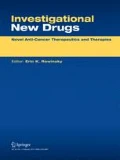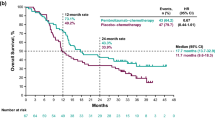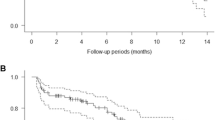Summary
Introduction This study aimed to assess the safety and tolerability of the multitargeted tyrosine kinase inhibitor, vandetanib (V), in combination with two chemotherapeutic agents, oxaliplatin (O) and docetaxel (D) in advanced gastroesophageal (GE) cancer. Methods This was a Phase I study (NCT00732745) with a standard 3 + 3 dose escalation design. The primary aim was to determine the optimal dose of the combination of vandetanib and OD chemotherapy. Results Initial treatment for the first cohort consisted of oxaliplatin at 100 mg/m2 on day 1, docetaxel at 35 mg/m2 on days 1 and 8 and vandetanib 100 mg PO daily of 21-day treatment cycles. As dose limiting toxicity (DLT) was reached in 2 out of 3 patients in cohort 1 (one grade 3 and one grade 4 diarrhea with dehydration), 6 patients were treated then at dose level −1 (O 80 mg/m2 on day 1, D 30 mg/m2 on days 1 and 8, V 100 mg PO daily days 1–21) in which no further DLTs were observed. This dose was established as maximum tolerated dose and is the recommended phase 2 dose. 8 out of 9 enrolled patients had adenocarcinoma. At dose level 1, 1 of the 3 patients had a documented partial response and 2 patients had stable disease. At dose level −1, 1 of 6 patients achieved a complete response, 2 of 6 patients had stable disease, and 3 of 6 patients had progressive disease. Conclusions Vandetanib added to oxaliplatin and docetaxel showed manageable toxicity and limited activity in advanced GE cancer.
Similar content being viewed by others
References
American Cancer Society: Cancer Facts and Figures (2012)
Enzinger PC, Mayer RJ (2003) Esophageal cancer. N Engl J Med 349(23):2241–2252
NCCN Clinical Practice guidelines in oncology. Esophageal cancer (2011)
Ajani JA et al (2007) Clinical benefit with docetaxel plus fluorouracil and cisplatin compared with cisplatin and fluorouracil in a phase III trial of advanced gastric or gastroesophageal cancer adenocarcinoma: the V-325 Study Group. J Clin Oncol 25(22):3205–3209
Ajani JA et al (2007) Quality of life with docetaxel plus cisplatin and fluorouracil compared with cisplatin and fluorouracil from a phase III trial for advanced gastric or gastroesophageal adenocarcinoma: the V-325 Study Group. J Clin Oncol 25(22):3210–3216
Tamura S et al (2012) Phase II study of docetaxel, cisplatin and 5-fluorouracil (DCF) for metastatic esophageal cancer (OGSG 0403). Anticancer Res 32(4):1403–1408
Chau I, Ashley S, Cunningham D (2009) Validation of the Royal Marsden hospital prognostic index in advanced esophagogastric cancer using individual patient data from the REAL 2 study. J Clin Oncol 27(19):e3–e4
Richards D et al (2008) Phase II trial of docetaxel and oxaliplatin in patients with advanced gastric cancer and/or adenocarcinoma of the gastroesophageal junction. Ann Oncol 19(1):104–108
Evans TR et al (2002) A phase I and pharmacokinetic study of capecitabine in combination with epirubicin and cisplatin in patients with inoperable oesophago-gastric adenocarcinoma. Ann Oncol 13(9):1469–1478
Evans D et al (2007) A phase I study of docetaxel, oxaliplatin, and capecitabine in patients with metastatic gastroesophageal cancer. Am J Clin Oncol 30(4):346–349
Hwang JJ, S.M, Moore DJ, McGreivy J, Park S, Zamboni WC, Marshall JL (2005) A Phase I and Pharmacokinetic (PK) Study of Docetaxel (DOC) and Oxaliplatin (OX). J Clin Oncol. 23(16s): p. suppl; abstr 2105
Gibson MK et al (2003) Epidermal growth factor receptor, p53 mutation, and pathological response predict survival in patients with locally advanced esophageal cancer treated with preoperative chemoradiotherapy. Clin Cancer Res 9(17):6461–6468
Walsh TN, Grannell M, Mansoor S (2002) Predictive factors for success of neo-adjuvant therapy in upper gastrointestinal cancer. J Gastroenterol Hepatol 17(Suppl):S172–S175
Okines A, Cunningham D, Chau I (2011) Targeting the human EGFR family in esophagogastric cancer. Nat Rev Clin Oncol 8(8):492–503
Okines AF, Reynolds AR, Cunningham D (2011) Targeting angiogenesis in esophagogastric adenocarcinoma. Oncologist 16(6):844–858
Bang YJ et al (2010) Trastuzumab in combination with chemotherapy versus chemotherapy alone for treatment of HER2-positive advanced gastric or gastro-oesophageal junction cancer (ToGA): a phase 3, open-label, randomised controlled trial. Lancet 376(9742):687–697
Shah MA et al. Phase II study of modified docetaxel, cisplatin, and fluorouracil with bevacizumab in patients with metastatic gastroesophageal adenocarcinoma. J Clin Oncol. 29(7):868–74
Rodriguez CP et al. Single-arm phase II study of multiagent concurrent chemoradiotherapy and gefitinib in locoregionally advanced squamous cell carcinoma of the head and neck. Head Neck. 34(11):1517–23
Dragovich T et al (2006) Phase II trial of erlotinib in gastroesophageal junction and gastric adenocarcinomas: SWOG 0127. J Clin Oncol 24(30):4922–4927
Ilson DH (2008) Esophageal cancer chemotherapy: recent advances. Gastrointest Cancer Res 2(2):85–92
Adelstein DJ et al. A phase II trial of gefitinib for recurrent or metastatic cancer of the esophagus or gastroesophageal junction. Invest New Drugs. 30(4):1684–9
David Ferry EA (2012) Phase III multi-centre, randomised, double-blind, placebo-controlled parallel arm trial of gefitinib versus placebo in esophageal cancer progressing after chemotherapy on behalf of the COG (Cancer Oesophagus Gefitinib) Collaborative Group. European Society for Medical Oncology (ESMO)
Ferrara N, Kerbel RS (2005) Angiogenesis as a therapeutic target. Nature 438(7070):967–974
Ohtsu A et al (2011) Bevacizumab in combination with chemotherapy as first-line therapy in advanced gastric cancer: a randomized, double-blind, placebo-controlled phase III study. J Clin Oncol 29(30):3968–3976
Morelli MP et al (2006) Anti-tumor activity of the combination of cetuximab, an anti-EGFR blocking monoclonal antibody and ZD6474, an inhibitor of VEGFR and EGFR tyrosine kinases. J Cell Physiol 208(2):344–353
Heymach JV et al (2007) Randomized, placebo-controlled phase II study of vandetanib plus docetaxel in previously treated non small-cell lung cancer. J Clin Oncol 25(27):4270–4277
Tamura T et al (2006) A phase I dose-escalation study of ZD6474 in Japanese patients with solid, malignant tumors. J Thorac Oncol 1(9):1002–1009
Robinson BG et al (2010) Vandetanib (100 mg) in patients with locally advanced or metastatic hereditary medullary thyroid cancer. J Clin Endocrinol Metab 95(6):2664–2671
Wells SA et al (2010) Vandetanib for the treatment of patients with locally advanced or metastatic hereditary thyroid cancer. J Clin Oncol 28(5)767–72
Wells SA Jr et al (2012) Vandetanib in patients with locally advanced or metastatic medullary thyroid cancer: a randomized, double-blind phase III trial. J Clin Oncol 30(2):134–141
Cohen MS, Hussain HB, Moley JF (2002) Inhibition of medullary thyroid carcinoma cell proliferation and RET phosphorylation by tyrosine kinase inhibitors. Surgery 132(6):960–966, discussion 966–7
Santoro M, Carlomagno F (2006) Drug insight: small-molecule inhibitors of protein kinases in the treatment of thyroid cancer. Nat Clin Pract Endocrinol Metab 2(1):42–52
Kouroussis C et al (2003) A dose escalation study of docetaxel and oxaliplatin combination in patients with metastatic breast and non-small cell lung cancer. Anticancer Res 23(1B):785–791
Schuette W et al (2005) Phase III study of second-line chemotherapy for advanced non-small-cell lung cancer with weekly compared with 3-weekly docetaxel. J Clin Oncol 23(33):8389–8395
Heymach JV et al (2008) Randomized phase II study of vandetanib alone or with paclitaxel and carboplatin as first-line treatment for advanced non-small-cell lung cancer. J Clin Oncol 26(33):5407–5415
Kaplan EL, Meier P (1958) Nonparametric estimation from incomplete observations. J Am Stat Assoc 53(282):457–481
Herbst RS et al (2010) Vandetanib plus docetaxel versus docetaxel as second-line treatment for patients with advanced non-small-cell lung cancer (ZODIAC): a double-blind, randomised, phase 3 trial. Lancet Oncol 11(7):619–626
Acknowledgments
The authors would like to express their gratitude to the nursing and support staff of University Hospitals of Cleveland/Case Comprehensive Cancer Center. This study was supported partially by Sanofi-Aventis and vandetanib was provided by Astra-Zeneca.
Ethical standards
The experiments comply with the current law of the US.
Conflict of interests
Dr. David J. Adelstein received research funding for the support of clinical studies from both Astra-Zeneca and Sanofi-Aventis and Balazs Halmos from Sanofi-Aventis while this study was being conducted.
The authors, Yuxia Jia, Joseph A. Bokar, Pingfu Fu, Rosalyn Juergens, Mary Beth Rodal, Afshin Dowlati, declare that they have no conflict of interest.
Author information
Authors and Affiliations
Corresponding author
Rights and permissions
About this article
Cite this article
Halmos, B., Jia, Y., Bokar, J.A. et al. A Phase I Study of the combination of oxaliplatin/docetaxel and vandetanib for the treatment of advanced gastroesophageal cancer. Invest New Drugs 31, 1244–1250 (2013). https://doi.org/10.1007/s10637-013-9945-8
Received:
Accepted:
Published:
Issue Date:
DOI: https://doi.org/10.1007/s10637-013-9945-8




